Bangladesh and the Bitcoin opportunity

Bitcoin is a decentralised digital currency that enables peer-to-peer transactions without intermediaries such as banks. Its fixed supply of 21 million coins and cryptographic security set it apart from fiat currencies, which are prone to inflation. As a deflationary asset, many consider Bitcoin "digital gold", a store of value and hedge against economic instability.
Bitcoin challenges traditional notions of money by offering a predictable, limited supply, making it an appealing alternative to inflationary national currencies. With only 21 million bitcoins available and more than 8 billion people worldwide, competition to secure a share is intensifying. Just as the internet transformed communication, Bitcoin is building a global financial network that enables direct value exchange across borders.
Educating the public is crucial to unlocking Bitcoin's benefits. Citizens need to understand the history of money, blockchain technology and the principles behind Bitcoin. Government and private institutions should launch public awareness campaigns and introduce educational initiatives explaining both the potential benefits and the challenges associated with Bitcoin and blockchain.
In a world where fiat currencies lose value through inflation, Bitcoin offers individuals a way to preserve wealth. Its scarcity and decentralised nature make it an attractive asset for long-term savings. Encouraging citizens to hold Bitcoin securely using private wallets can promote financial sovereignty and reduce reliance on traditional banking systems. Businesses face similar challenges, as inflation and currency devaluation threaten corporate balance sheets. By holding Bitcoin, companies can hedge against these risks while integrating Bitcoin payments and blockchain-based services into their operations, positioning themselves to remain competitive in a rapidly evolving global economy.
Bangladesh could benefit greatly by diversifying its foreign reserves with Bitcoin. This would reduce reliance on the US dollar, strengthen financial independence and provide a hedge against global economic shocks. A national Bitcoin reserve could help manage debt through potential long-term appreciation, enhance sovereignty by reducing dependence on external financial systems and enable international trade outside traditional channels of control. Such a reserve could also support crisis management by providing decentralised liquidity and funding long-term infrastructure and innovation through reserve growth over time.
Bitcoin mining is another strategic opportunity. Mining involves solving cryptographic puzzles to validate transactions and secure the network, with miners rewarded in new Bitcoins and transaction fees. Although energy-intensive, mining is essential to Bitcoin's decentralised infrastructure. Bangladesh could invest in renewable energy-powered mining facilities, creating jobs and technological expertise while directly accumulating Bitcoin. Mining could also strengthen cybersecurity by ensuring national participation in the global proof-of-work system, projecting influence in a digital space where traditional military power is limited.
Globally, the Bitcoin mining hash rate remains concentrated. As of 2025, the United States contributes about 38 percent, China 21 percent, Kazakhstan 13 percent, while Canada, Russia and Germany each contribute between 5 and 10 percent. Other countries, including Iran, Venezuela and Malaysia, hold smaller shares. With the right energy policies and investment, Bangladesh could establish itself in this growing sector.
Despite this potential, Bitcoin remains banned in Bangladesh. Yet embracing it could act as a catalyst for national prosperity, financial innovation and global competitiveness. Citizens, businesses and the government all have roles in this transition. Lifting the ban and investing in education, infrastructure, and strategic reserves could position Bangladesh at the forefront of the next financial era. With informed participation, the country could secure a place in the decentralised digital economy and chart a path towards sustainable economic independence.
The writer is a software engineer at JPMorgan Chase & Co. He can be reached at matiur.rahman@thebitcoinworld.org



 For all latest news, follow The Daily Star's Google News channel.
For all latest news, follow The Daily Star's Google News channel.